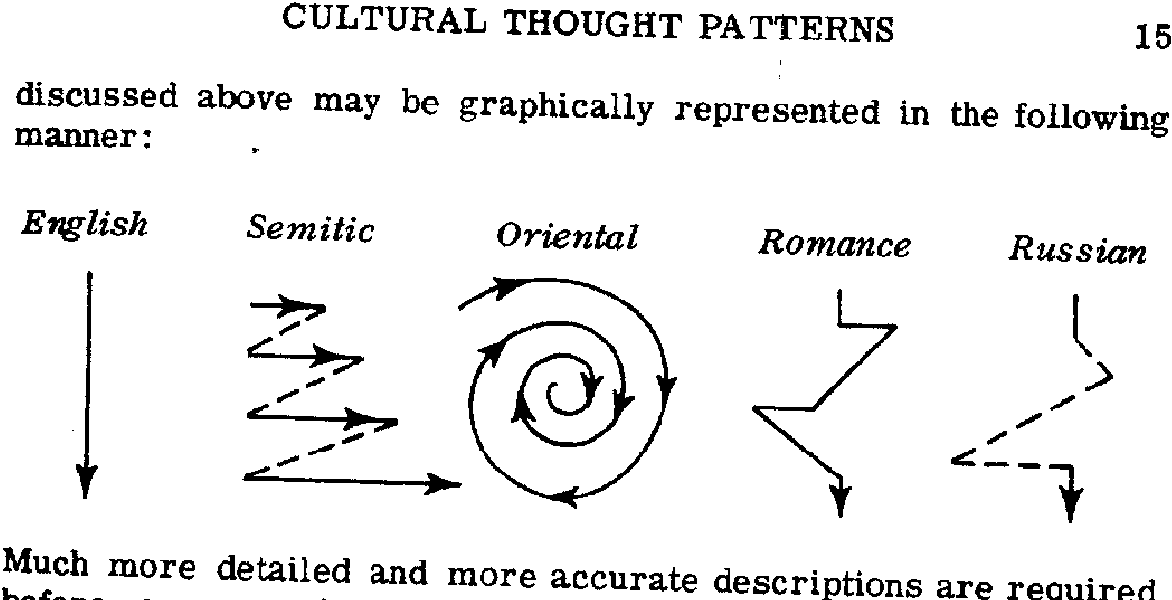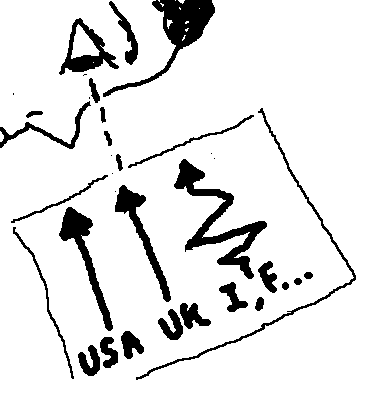Ethnocentric concept in Kaplan.
Avoid colloquial words and expressions.
Make it clear to the listener how various parts of the talk are related by using, for example, signalling words or gambits.
To protect your stance on a particular subject and to make your claims less attackable, ‘hedge’ what you say. (N.B. ‘hedge’, not ‘fudge’)
You must provide evidence and justification for any claims you
make.
(N.B. For premises and accessory claims, you can simply cite
authorities.)
Gentlemanly
(in turn taking)
Quantitative analyses, employing chi-square
and t-tests, suggest that participants in academic discussions
turn-take at Complex Transition Relevance Places* (Ford and Thompson,
1996).
*The conjuncture of
syntactic, intonational and pragmatic completion points.
Academic speech differs from Academic writing in that it is:
Spoken language, whether academic or not, has shorter words and is
lexically less dense with a less varied vocabulary. It uses more
verb-based phrases than noun-based phrases. Spoken texts take longer
to communicate a given quantity of data (because of necessary
redundancy and error checking). In absolute terms, however,
they are shorter than equivalent written texts: a conference talk
would be tiresome if it were as long as the academic paper that it
illustrates.
Spoken academic lectures and written academic
papers are equally complex, although different techniques are used to
structure each variety. Written academic language uses
grammatical complexity more (e.g., numerous subordinate clauses) and
focuses less on actors and more on the events (thus a greater use of
passive voice). Spoken academic language focuses more on actors (thus
a greater use of active voice) and has greater associative
complexity: it uses uses numerous signals (paralinguistic effects,
intonation, gestures, gaze, gambits such as 'you know',
reiteration...) to prompt listeners to establish links and
subordination among apparently paratactic items.
More
subjective/interpersonal and more highly indexical
Spoken language in general has more words that refer to speakers and their audiences (although, as in writing, the argumentation attempts to appear non-subjective). It is also highly indexical: the many signaling devices just mentioned also indicate how the speaker views what he is saying (dubious, ironic, adamant...). In fact, people attend academic lectures (instead of reading the author's works) precisely to grasp the speaker's attitudes and deontic stance towards his claims. Good academic speaking should therefore be occasionally interpersonal and constantly indexical.
The often-cited Kaplan diagrams...
Descriptive intercultural education inevitably falls into the trap of ethnocentrism and stereotyping. Take the case of the often-cited Kaplan. He sought to help his readers understand the differences among various cultures with these diagrams:

Kaplan,
R. (1966). "Cultural thought patterns in intercultural
education". Language Learning, 16 (1), 1-20.
[Available
on the web here.]
But do Orientals really think they are reasoning in circles? Do Romance speakers -- thus Italians -- really think they are zigzagging in their reasoning? Perhaps this is just how one American (Kaplan) sees their way of expressing themselves, because he doesn't notice or appreciate the terrain on which they construct their reasoning.
Kaplan, in fact, seems to consider the reality of Romance (Italian, French...) speakers to be perfectly flat and unproblematic; thus a straight line is necessarily the shortest distance between two points (e. g. between a premise and a conclusion). Digressions are therefore to be considered zigzagging, a waste of time and energy...


But is the terrain on which they situate themselves always flat and unproblematic?
But if we situate ourselves "on the terrain" (if we learn to see the reality, as lived by Romance speakers as THEY live it and see it), then perhaps a zigzag is indeed the shortest distance between two points.

In other words, only if we learn to see the reality of our interlocutors, by situating ourselves on their terrain, can we appreciate the "reasonableness" of their mode of thinking. To see their reality from OUR point of view "above it", without taking into consideration what THEY see as "obstacles", is to oversimplify and to misunderstand.
Conclusion
When
speaking or writing in English, we should avoid Kaplan's mistake of
imposing OUR idea of "linearity" or "logic" on
our Anglo interlocutors or readers.
Indeed, since what
is "linear" or "logical" in our culture may seem
contorted and illogical in another, we should eliminate the words
"linear" and "logical" from our vocabulary.
Our goal should be to speak and write in a way that our interlocutors
find "readily understandable" and "convincing"
from their standpoint.
For example, as Italians
you may think that it is "logical" and even "necessary"
to express preliminary thoughts before giving specific information.
But when communicating with Anglos, you should save this
"preliminary" thoughts for your conclusion and begin with
the specific information!
Is this illogical?
Well, not for an Anglo mind.
Besides, as we just said,
it is not a question of being "logical" or "illogical"
but of being "readily understandable" and
"convincing". You help Anglos understand you
better (and you convince them better) if you tell them immediately
dove vuoi arrivare. Here is an illustration of this procedure.
Exam Question: Which Englishes have "norm providing" status?